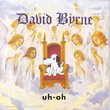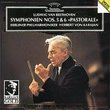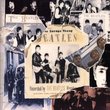| All Artists: Ludwig van Beethoven, Herbert von Karajan, Berlin Philharmonic Orchestra, Janet Perry, Vinson Cole Title: Beethoven: Symphonie No. 9 Members Wishing: 0 Total Copies: 0 Label: Deutsche Grammophon Release Date: 10/12/1993 Genre: Classical Styles: Historical Periods, Classical (c.1770-1830), Modern, 20th, & 21st Century, Symphonies Number of Discs: 1 SwapaCD Credits: 1 UPC: 028943900621 |
Search - Ludwig van Beethoven, Herbert von Karajan, Berlin Philharmonic Orchestra :: Beethoven: Symphonie No. 9
 | Ludwig van Beethoven, Herbert von Karajan, Berlin Philharmonic Orchestra Beethoven: Symphonie No. 9 Genre: Classical
|
Larger Image |
CD DetailsSimilarly Requested CDs
|
CD ReviewsKarajan just kept getting better Warren R. Davis | Haddonfield, NJ USA | 09/08/2004 (5 out of 5 stars) "The debate is endless over which version of Karajan's 9th's is the best, which just goes to show that he was one of the best. There is really no point in finding a winner. Those who swear by the 1963/64 Karajan/Berliners partnership are entitled to their thrill. I, too, enjoy the exuberance of that performance to this day. And as time went on, I eagerly anticipated the next Karajan-Beethoven cycle of the late 70s, with even better recording values, raising the bar again. To my mind, they never disappointed. Each subsequent recording added clarity and understanding: both with better technology making the sound more transparent, and with an evolving interpretation matched in every way by the maturation of the finest marriage between conductor and ensemble in our lifetimes. I just can't imagine a "better" performance of this symphony than in this last by Karajan and the BPO. Two of the last three by Furtwaengler (the war time BPO and the 1951 Bayreuth Festival), the live recordings of Klemperer and the Philharmonia (1957 and 1961, both now available on BBC Testament), and Bruno Walter's monaural NYPO and LPO and stereo Columbia Symphony Orchestra interpretations rank with each of the Karajan versions. To those so charged by the 1964 Karajan/Berlin version, they should perhaps explore the earlier Karajan/Philharmonia recording for Walter Legge (also Klemperer's producer) on EMI for similar, even quicker paced, thrills, albeit 1950's technology. If you want it all, buy them all. If you want just one of the Karajan/Berliners collaboration, then this is the one. You will be awestruck." Good sound, but the performance is inferior to Karajan's ear Alan Majeska | Bad Axe, MI, USA | 10/10/2005 (4 out of 5 stars) "I give this 4 stars because the performance is acceptable, but inferior to Karajan's earlier Beethoven 9ths recorded for DG with the Berlin Philharmonic: the 1962, considered by many to be his best; and the 1977, which is close to the 1962, if not just as good. The recorded sound in both of the earlier DG 9ths is better than this digital recording, which seems un-natural and cold, though technically perfect. I can't say why I don't like this: II seems boring somehow - perhaps phrasing, and I like the 2nd movement to be played at a fast tempo, with forward drive and motion. III seems somehow artificial, and doesn't flow as did Karajan's earlier recordings. In IV, the four vocal soloists are all good, but not outstanding, and Karajan's tempos seem too driven to me. Perhaps Karajan's digital 9th is too much like Szell in some ways, but without relaxing where needed; Karajan's earlier 9ths had a little of Furtwangler or Bruno Walter in them, to make them more musical and warm. And both of the earlier 9ths have better recorded sound, which is more natural, rich and full. I don't mean to sound too hard on Herbert von Karajan (1908-1989) who was without a doubt one of the great 20th century conductors, and whose work with LPs and later Videodiscs sold many copies and acquainted music lovers around the world with great music. By contrast, Karajan is excellent in works such as "Wellington's Victory," "Gratulations Minuet", and "Ritterballet" all in Volume 3 of the DG Beethoven Edition. For a Karajan Beethoven 9th, I would go with either the 1962 or 1977 recording, either as part of a complete cycle, or issued as individual discs (DG). For other Beethoven 9ths, check out Szell (Sony), Reiner/Chicago (RCA), Furtwangler/Philharmonia (Tahra, recorded live, August 1954 at Lucerne, Switzerland), or Bohm/Vienna (DG, 1970)." A must have for fans of the 9th J. Dabgotra | Los Angeles, CA | 11/11/2002 (5 out of 5 stars) "This is Karajan's least popular of the four total recordings he did of this symphony, albeit it is the only digital recording. The 1963 recording is the most popular and, admittedly, my favorite of his four recordings as well. The 1977 recording is also popular. However, this recording is fantastic in its own ways, and I recommend a Beethoven or Karajan fan own this recording for several reasons.Being Karajan's only digital recording, he had the chance to develop his philosophy of sound engineering to the fullest. Now, many people hate this emphasis on smoothness and texture, but I think we should be more open-minded. I own roughly 25 performances of this symphony, and it is the unique performances that are most enlightening--those performances where the conductor took his own take. Gardiner and Furtwangler for example. And love it or hate it, Karajan put a lot of thought into his Beethoven, into the sound texture, the tempi, the balance, etc. The winds are rather low, the strings are smooth and powerful, the chorus is low, the brass is loud. A lot of thought went into the sound engineering, for good or ill. This is one great conductor's version of the greatest symphony composed, and it is for that reason why we should listen closely.The soloists aren't nearly as good as previous recordings, but they are fair, and the tenor, though a bit weak, does have a remarkable voice in my opinion. The dynamics are incredible but perhaps overemphasized, the clarity is wonderful (the timpini sound more real than previous Karajan recordings). Take, for example, the orchestral interlude in the fourth movement, before the climax. This is wonderfully done. Karajan speeds up the orchestral presentation of the Ode to Joy in the beginning of this movement when compared to his previous recordings, and I think this is a mistake. Overall, Karajan selects some of the best tempi, especially in the fourth movement. Though the chorus can hardly be heard at times, it allows the orchestra to be heard with greater strength and clarity. After the climax -- in the seid umschlugen and thereafter -- the singing and tempi are awe-inspiring. The tempi here are slower than his previous recordings, and it makes for a beautiful effect. Some think of Karajan as a cold Beethoven interpreter, but this recording at certain moments is more likely to inspire tears and feelings of the profound over Solti or others. The first movement is dark and pounding, but does not compare to the 1963 recording. The scherzo is much darker than his previous recordings."
|

 Track Listings (5) - Disc #1
Track Listings (5) - Disc #1

![Perennial Favorites [ENHANCED CD]](https://nationalbookswap.com/cd//m/10/6810/366810.jpg)






